The Smart Side of Paris: The Gare de Boulainvilliers
About nine kilometers east of Charles de Gaulle Airport is the tiny little town of Juilly with barely 2,000 inhabitants. Surrounded by agricultural fields, it is a speck on the map surrounded by other nondescript villages like Nantouillet, Vinantes, and Thieux. Juilly houses the remains of the oldest collège in France that closed its doors in 2012, 374 years after opening. Owned for centuries by the Order of the Oratorians, they could no longer keep up with the repairs required. The buildings fell into awful conditions, leading some to think that they would be razed. However, the French are inveterately successful repurposers and France’s Society for History and Patrimony gained permission to turn the collège into 217 living quarters, hopefully available for purchase in 2025. The plans are unsurprisingly inviting and beautiful and the prices far more reasonable than one might imagine.
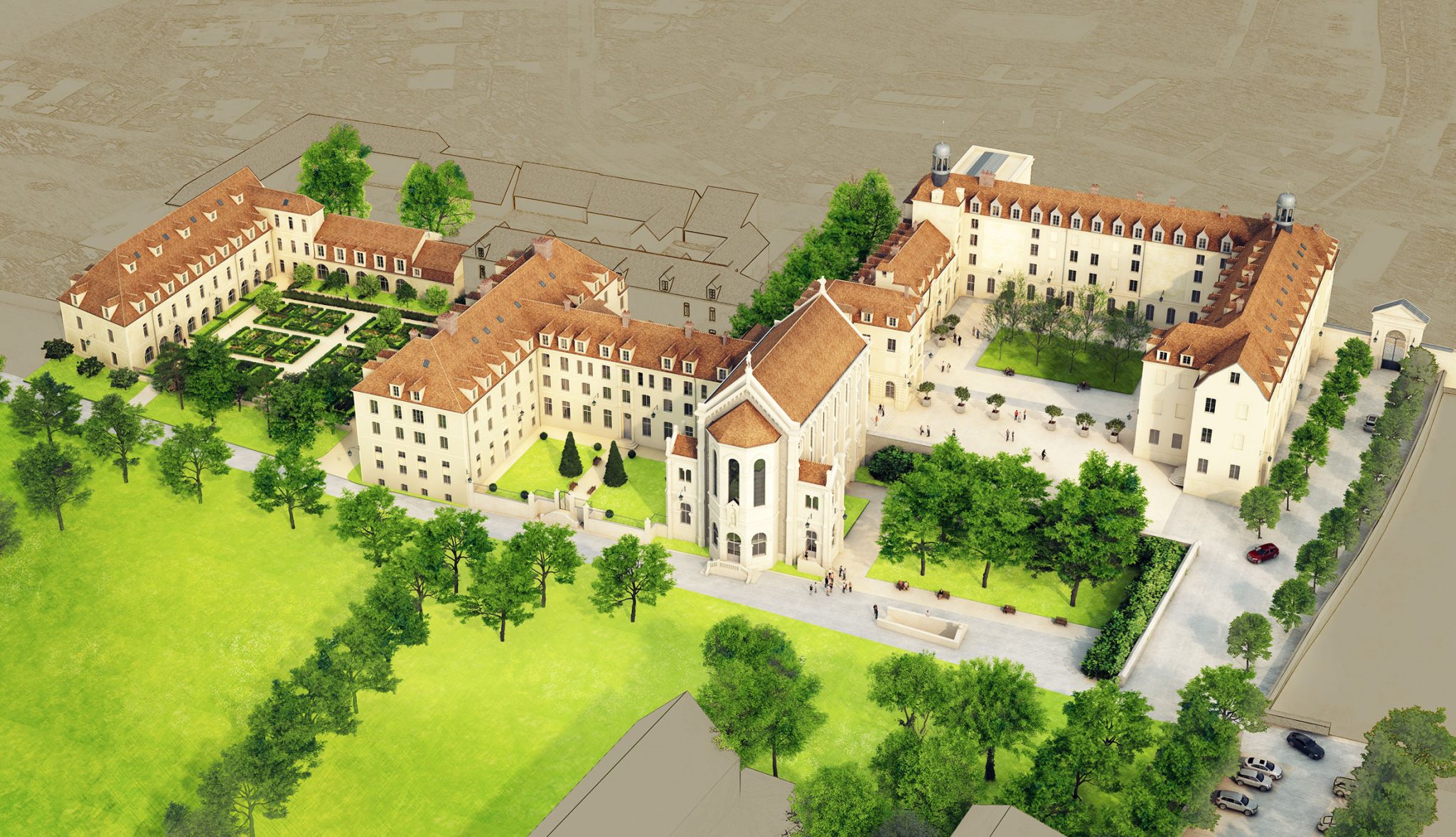
Artistic rendering of Juilly residences, courtesy of Corneille Patrimoine
In its nearly 400-year history, the Collège de Juilly has produced some very famous graduates. Montesquieu — perhaps the most famous pre-20th century French thinker after Voltaire and Montaigne — attended Juilly, as did the famous actor Philippe Noiret; the singer Michel Polnareff graduated from Juilly; and the infamous Jacques Mesrine (“The Man of a Thousand Faces”), France’s most notorious criminal, rounds out the most frequently mentioned names.
But in all of the publicity surrounding Juilly’s rebirth, I have not found any mention of one of its most intriguing graduates: Henri de Boulainvilliers.
Exactly 46 kilometers southwest of Juilly is the old and beautiful Gare de Boulainvilliers on the RER-C line between the Eiffel Tower and the Bois de Boulogne. It isn’t used much since most travelers exit on one of the two previous stops: the Champs de Mars / Tour Eiffel or the Avenue du Président Kennedy / Maison de Radio France. Or one might continue past Boulainvilliers to Avenue Koch, which is right on the edge of the Bois de Boulogne and leads to the Arc de Triomphe.
The collège of Juilly and the Gare de Boulainvilliers are connected by more than a circuitous transit route. Henri de Boulainvilliers began his studies at the Collège de Juilly in 1669 and, by a stroke of good fortune, studied under the inimitable Richard Simon (1638-1712), who I wrote about in an earlier article.
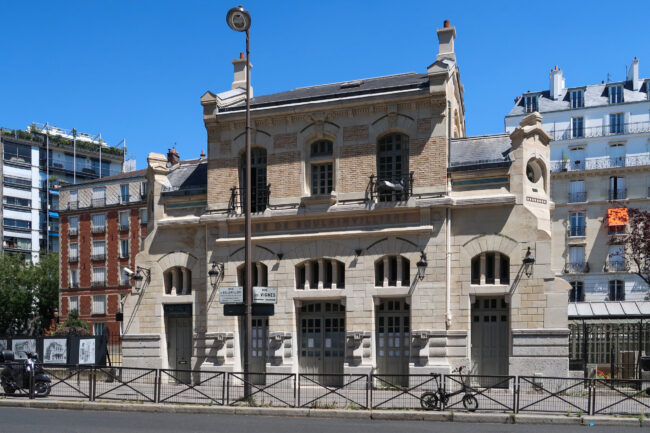
Gare de Boulainvilliers. Photo credit: Celette / Wikimedia Commons
I suspect that few Parisians know that the Gare de Boulainvilliers was named for the great French intellectual Henri de Boulainvilliers (1658-1722) — and that a minor planet (8521 Boulainvilliers) is named after him as well. Boulainvilliers, like the metro station and the planet that bear his name, is unnoticed today despite the breadth of his writings and the powerful impact he had on early 18th-century French thought. He wrote four books on Physics: The Idea of a General System of Nature, a book on chemistry, one on astrology, and another on the general topic of experimental philosophy; four books on the history of France which influenced later historians to follow rigorous research methods; a book of philosophy that emphasized proper methods of reasoning, and one on mysticism. Contemporaries claimed that he wanted to know and write about everything.
However, much of what Boulainvilliers wrote and distributed remained in handwritten manuscript form, passed around among a select group of trusted intellectual peers. These daring writings questioned every corner of orthodox thought, forming part of the fascinating underground world of French clandestine writing. Known today mostly to historians of 17th and 18th century thought, clandestine literature deserves to be popularized in the very least so that we can see an age in which ideas could be dangerous, censorship ruled the day, and freedom of expression was narrowly circumscribed.
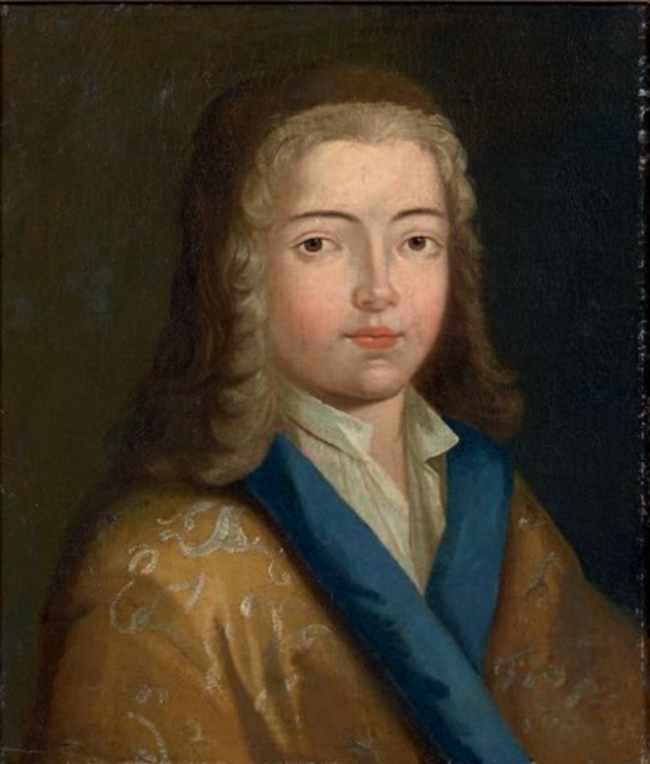
Presumed portrait of Henri, Comte de Boulainvilliers. Photo: Drouot/Wikimedia Commons/ Public domain
Boulainvilliers wrote a good deal of history containing ideas that, to modern readers, may seem benign and even obvious; to contemporary readers, they screamed of radical ideas. History had been largely seen through the lens of Scripture, which emphasized God’s intimate role in humanity’s existence. Whether the Israelites were crossing into the Promised Land, or the Emperor Constantine was destroying his enemies under the banner of the cross, the miraculous was never far from the story. Boulainvilliers was among the first historians to strip history of its mystery, emphasizing “psychology, worldly circumstances, and geographical context” to reveal the universal causes to humanity’s actions. In essence, Boulainvilliers thought that good history had to eliminate its mythical element.
This was a skill that he learned under the tutelage of the great scholar Richard Simon at the Collège de Juilly: textual criticism. Today, we take for granted that we ought not believe everything we read, even if the writing is supposedly sacred. But the very idea that we should apply critical thinking to formerly undisputed claims was ground-breaking, shocking, and exciting. In fact, one author sees the critical examination of texts happening toward the end of the seventeenth century as transforming “whole fields of knowledge,” including Bible studies, the “history of religions, history of philosophy,” our understanding of various ancient civilizations, and humanity’s vision of political life. Boulainvilliers was at the forefront of this effort.
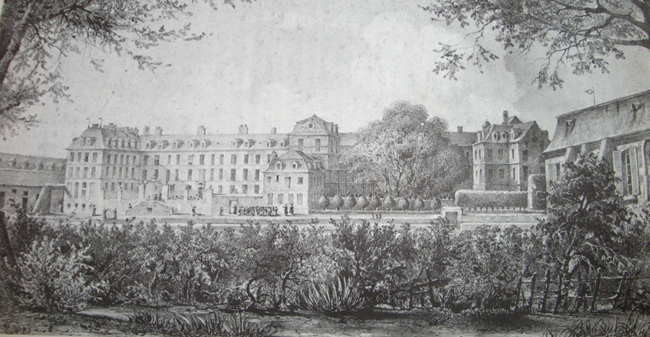
Engraving of the Collège de Juilly, 1824. Photo: Malebranche/Wikimedia Commons
Despite his relatively unknown status today, contemporaries valued his ideas a great deal. We find Diderot borrowing from Boulainvilliers for his article on “Certitude” in L’Encyclopédie, and Voltaire dedicated an entire book to him (Dinner of the Count of Boulainvilliers). And, when a particularly heretical book was found, Boulainvilliers was sometimes assumed to be the author. Later 18th-century writers commonly considered him among the most important radical philosophers of the turn of the century, ranking him with “Bruno, Spinoza, Collins, and Tolland.” And he seems to have been responsible for “a surprisingly large number of clandestine manuscripts.” These were considered to be of such value — or to hold such dangerous ideas — that when Boulainvilliers died, the Regent of France sent soldiers to secure his manuscript writings. These writings were “revered, preserved, copied, and propagated, and helped drive… a philosophical counter-culture in Paris.”
Boulainvilliers’ influence was such that one scholar calls him “the second founding father of the French Radical Enlightenment.” He despised Louis XIV’s despotic tendencies, and rejected the possibility of Christian revelation, blind faith, the Creation myth, the existence of spirit, and miracles; he insisted that reason should be the ultimate judge of all truth, and, interestingly, was one of few who praised Mohammed and gave an even-handed account of Islam.
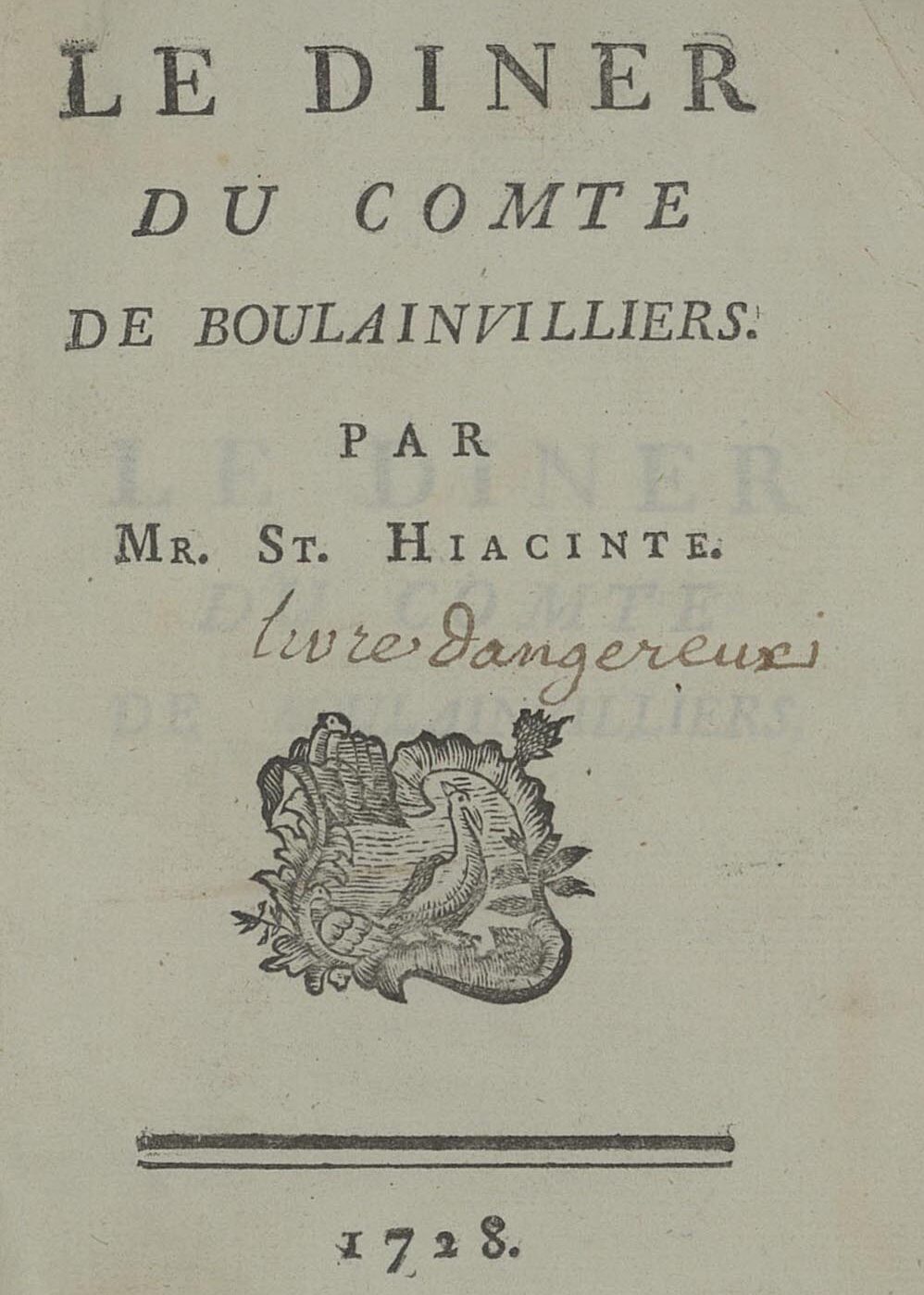
Voltaire, “Dinner of the Count of Boulainvilliers” title page.
What shines through in Boulainvilliers’ writings is a willingness to reconsider sacred ideas, an insistence on using evidence to substantiate claims, a rejection of authority as a standard of judgement, and the hypothesis that understanding ourselves involves understanding the history of humanity more broadly.
In discovering Boulainvilliers, we cannot help but be reminded that one of the more fascinating things about Paris is that behind even the names of train stations, one can find a world of appreciation of its vast intellectual heritage.
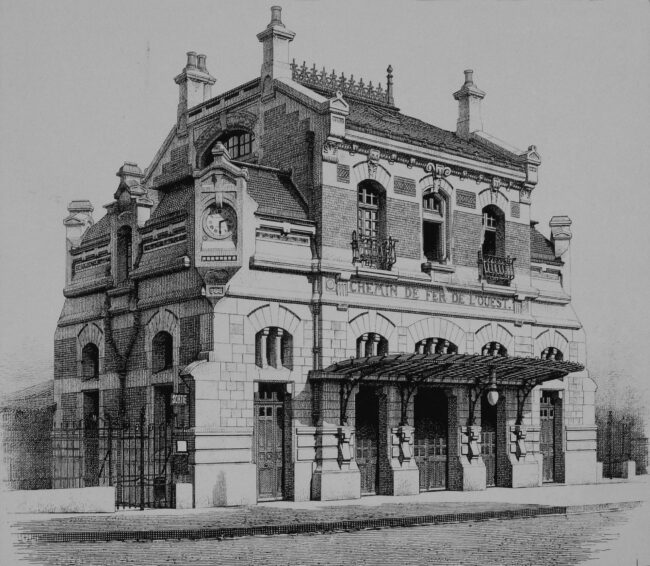
The Gare de Boulainvilliers around 1900. Photo credit: Unknown author. Public domain
Lead photo credit : Aerial view of Juilly. Photo credit: Pymouss/ Wikimedia Commons
More in Gare de Boulainvilliers, Henri de Boulainvilliers, history, RER C, The smart side of Paris
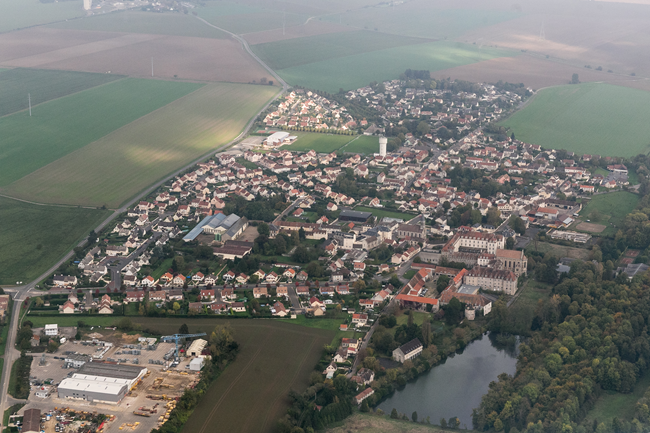
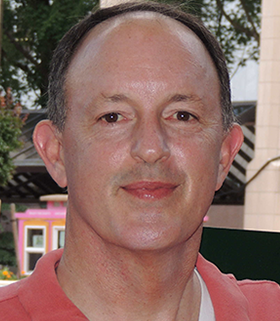
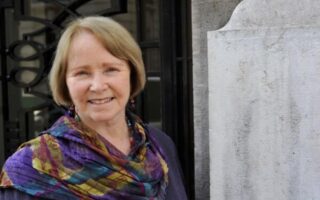


REPLY